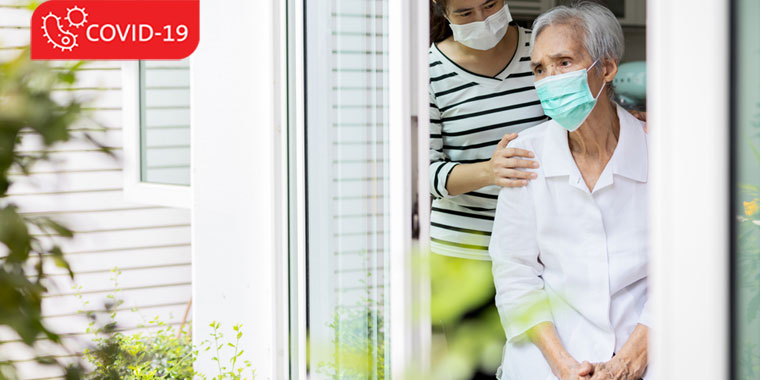Stay Connected With Dementia Patients

Answer a few questions and we'll provide you with a list of primary care providers that best fit your needs.
When the coronavirus pandemic began in spring 2020, Ohio’s nursing homes isolated themselves to protect patients. The strategy kept the state’s death rate in long-term care facilities relatively low, but it also took an emotional toll on people with dementia and their loved ones. Unable to touch or see each other face to face without barriers, family members had to find new ways to make meaningful connections.
Being separated from loved ones in nursing homes, for whatever reason, can lead to sadness, guilt, resentment, and other negative emotions. To help ease these emotions, try activities to stay engaged with family members despite quarantines or other causes of separation. For example, you can make art or gifts for loved ones, and either share these gifts in person, when it is possible, or mail or ship them to the nursing home.
Other ideas are to send photos, a pretty card, or something your loved one can experience through touch, smell, or taste.
Smartphones and other electronic devices can help people communicate virtually. Often, a caregiver at the nursing facility or memory unit will need to assist your loved one who has Alzheimer’s disease or dementia.
Music can be another point of connection. Some patients with dementia respond well to music. You could sing a song or play a familiar tune they like and send them the recording. Whether you send a song or a story, your voice can be comforting to them.
On the bright side, patients with advanced dementia perceive the passage of time differently and may not be troubled as much as their relatives who miss them.
For those who need medical care, consultations with a doctor have become easier through the use of telehealth video visits.
Many routine doctor visits for dementia care can be done effectively via telehealth. It is a very useful tool that has gained wide acceptance after COVID-19 created new barriers to in-person visits. Many areas of neurology, including cognitive and behavioral neurology, are adopting teleneurology.
Caregiving At Home
Spouses or adult children taking care of a person with Alzheimer’s at home have faced additional stress and strain from the threat of coronavirus.
Additional duties include implementing social distancing and handwashing for people who cannot do it for themselves.
To help manage the stress of caregiving, it is very important for caregivers to have outlets for stress relief. Caregivers should make it a priority to take personal time for self-care, hobbies, and normal social interactions when looking after a dementia patient at home – whether or not COVID is in the picture. This will help make you happier and more capable of being an effective caregiver.
The Centers for Disease Control and Prevention (CDC) offers these suggestions for caregivers at home:
- Get adequate sleep and regular exercise. Take a walk, stretch, or do some deep breathing as simple ways to relieve stress.
- Set a routine for meals, sleep, and exercise. This can be comforting to both you and your loved one. Schedule an activity you enjoy every day, or at least every week.
- Take a break from the news and social media. Our 24-hour news cycle can be overwhelming and stressful.
- Connect with family and friends. Zoom calls, visits outdoors, or in-home visits with a close family member can help lift your spirits and relieve the strain of caregiving.
- Find a local online support group. It’s comforting to know you are not alone and that other people are experiencing similar struggles.
- Make plans for a backup caregiver. If you become ill with COVID-19 or some other ailment – or even if you just need a break – it’s important to know who you can call to provide your loved one’s care in your absence.
The CDC also advises calling your health care provider if stress and anxiety are making it difficult for you to perform your daily activities several days in a row.
Answer a few questions and we'll provide you with a list of primary care providers that best fit your needs.
Source: Centers for Disease Control and Prevention




